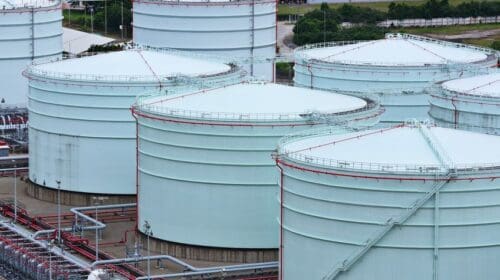The energy sector is on the brink of a technological renaissance, with career opportunities expanding as the industry’s needs evolve. Data engineers, a critical link in harnessing the deluge of information, are expected to grow in prominence as data-driven decision-making becomes the norm. But what other in-demand skills are reshaping jobs in the oil and gas industry? As the adoption of cloud computing accelerates and data visualization becomes more visually appealing and intuitive, even traditional roles are transforming, demanding new technological skills.
With blockchain technology advancing and 5 billion devices anticipated to be connected to the internet by 2025, the landscape of resource utilization is shifting. Online presence is not just a term for service providers anymore—it’s a vital component of the oil and gas sector’s operational strategy. As these skills demand a burgeon, what does it mean for the future career paths of energy professionals? Stay tuned as we explore the intersection of technology and oil and gas, where soft skills and hard tech expertise converge to unlock a new era of potential.
The Technological Transformation of the Oil and Gas Industry
A seismic shift is underway within the energy sector—a transformation driven by the relentless pace of technological advancement. This shift is altering how the sector operates and the skill sets it prizes. As the industry grapples with the challenges of a global economy and the imperatives of the energy transition, integrating emerging technologies is imperative for staying competitive. Once known for its mechanical might, the oil and gas industry is seeking individuals who can wield digital tools with skill.
The industry’s future is undeniably intertwined with technology, from adopting digital oilfields to the intricate data analysis required for maximizing extraction. As the global energy landscape becomes increasingly interconnected, the demand for professionals adept in emerging technologies and who possess robust technical skills is growing. The energy sector’s voyage into this new age is about staying relevant and leading the charge in an evolving global economy.
Embracing Digitalization for Enhanced Efficiency
Adopting augmented reality and remote sensing technology in the oil and gas industry exemplifies the push toward digitalization for improved efficiency. Augmented reality, once the province of gaming and entertainment, enables technicians to perform complex tasks with enhanced precision and safety. Meanwhile, remote sensing technology has revolutionized the way we understand and interact with the physical environment, allowing for sophisticated analysis and monitoring of oilfield operations from afar.
These advanced technologies are transforming the industry’s problem-solving and operational management approach, enabling a level of oversight and control previously unattainable. By embracing these digital tools, the oil and gas sector is improving its current processes and paving the way for a more sustainable and efficient future.
The Role of Automation and Robotics in Streamlining Operations
Automation and robotics are introducing new design principles into the oil and gas industry, streamlining operations, and setting new standards for productivity. Robotics, with its precision and reliability, is taking on hazardous roles for human workers. At the same time, automation systems manage repetitive tasks, freeing up human talent for more complex problem-solving. This symbiosis between man and machine leads to unprecedented efficiency and safety in the field.
As these technologies become more sophisticated, their adoption is not just a matter of operational convenience but a strategic imperative. In an industry where the margins for error are slim and the stakes are high, the role of automation and robotics in ensuring consistent, high-quality output is invaluable.
Critical Information Technology Skills in Energy
The oil and gas industry, a cornerstone of the global economy, is inextricably linked to the energy sector, where technical skills are in high demand as companies strive to keep pace with the rapidly changing landscape. Software engineers, augmented reality specialists, and robotics engineers are becoming as integral to the energy industry as geologists and petroleum engineers once were. In this competitive environment, energy professionals who can navigate operating systems, manage large amounts of data, and utilize real-time data are becoming valuable assets.
Emerging technologies such as drone technology, IoT sensors, and 3D seismic mapping create new career opportunities and require new technology skills. As these tools become increasingly connected to the internet, the innovation potential grows, and so does the need for vigilance against potential issues such as data breaches. Energy professionals must develop these skills regularly to stay ahead in a rapidly evolving industry.
Cybersecurity Measures to Protect Sensitive Data
In an era where unprecedented amounts of data are generated, the oil and gas industry’s need for cybersecurity measures has never been more critical. Tech skills in 2024 are highly sought after, with cybersecurity expertise topping the list. Defending the industry’s vast digital assets requires specialized skills, including vulnerability assessment and developing robust security protocols.
As the industry becomes more data-centric, protecting sensitive information is paramount. Energy companies are looking for professionals who can fortify their digital fortresses, making cybersecurity proficiency one of the most in-demand skills for those seeking an energy career.
Data Science and Its Impact on Exploration and Production
Data science is revolutionizing oil and gas exploration and production, bringing precision and predictive power to processes once guided by intuition and experience. By analyzing vast datasets, data scientists can uncover patterns and insights that lead to more efficient resource extraction and better risk management. This scientific approach to the industry’s core activities reshapes the landscape, making data science expertise a coveted asset.
As the oil and gas sector continues to embrace data-driven strategies, the impact of data science on the industry’s future cannot be overstated. It’s a field that enhances operational efficiency and fosters innovation, making it a key area of focus for those looking to make a mark in energy.
Specialized Software Proficiencies for the Energy Sector
Technical skills are rapidly becoming as important as traditional geological and engineering expertise in the oil and gas industry. Software engineers are now at the forefront of the energy sector, developing and refining the tools that power everything from data analysis to machinery control. As the industry navigates the global energy transition, proficiency in emerging technologies like blockchain development and 3D seismic interpretation is increasingly sought after.
The demand for energy professionals who can provide data-driven insights and manage real-time data through advanced software is reshaping the oil and gas sector. These critical skills enhance operational efficiency and are key to maintaining a competitive edge in a rapidly changing industrial sector. For businesses of all sizes within the global energy economy, having a workforce adept in these areas is a fundamental strategy for success.
Mastery of Geographical Information Systems (GIS)
Geographical Information Systems (GIS) have become indispensable tools in the energy sector, offering a powerful means for visualizing and analyzing spatial data. Mastery of GIS enables professionals to map potential drilling sites, assess environmental risks, and plan infrastructure development with heightened accuracy and insight. This expertise is vital for making informed decisions that balance economic benefits with environmental stewardship.
As the oil and gas industry prioritizes sustainable practices, GIS proficiency has emerged as a key competency for those looking to advance their careers. The ability to interpret and apply geospatial data is not just a technical skill; it’s a strategic asset that can provide a competitive advantage in the quest for energy resources.
Petroleum Data Analysis with Industry Standard Tools
Industry-standard tools for petroleum data analysis are essential for business analysts in the oil and gas sector. These tools enable the synthesis of complex datasets into actionable intelligence, informing decisions on everything from drilling operations to market strategies. Business analysts equipped with these tools can provide a level of insight that is essential for driving profitability and efficiency.
The depth of understanding from sophisticated data analysis is invaluable in an industry where precision can make the difference between success and failure. As such, proficiency with these industry-standard tools is beneficial and essential for those looking to excel in the competitive world of oil and gas.
Leveraging the Internet of Things (IoT) in the Oil and Gas Field
The Internet of Things (IoT) is revolutionizing industries worldwide, and the oil and gas field is no exception. With the advent of smart cities, the principles of interconnected devices and systems are being applied to the energy sector, enabling more efficient and responsive operations. IoT technologies allow for real-time monitoring and control of equipment, leading to enhanced safety, reduced downtime, and optimized resource utilization.
Implementing IoT strategies in the oil and gas industry requires a unique blend of technical know-how and strategic vision. As the sector moves towards a more digitized and interconnected future, industry leaders will be renowned for effectively leveraging IoT technologies.
Implementing Predictive Maintenance Strategies
Predictive maintenance strategies, empowered by advanced analytics and machine learning, transform how the oil and gas industry approaches equipment upkeep. By predicting when maintenance is needed before a failure occurs, companies can significantly reduce unplanned downtime and extend the life of critical assets. This proactive approach saves time and money and enhances operational safety.
Successful predictive maintenance implementation requires a deep understanding of the patterns and signals that precede equipment issues. Developing the skills to leverage these strategies is becoming increasingly important for industry professionals as the sector evolves towards more technologically advanced operations.
Real-Time Asset Tracking and Management
Real-time asset tracking and management are critical for modern oil and gas operations. They provide a window into the precise location and condition of equipment and resources. This capability enables rapid decision-making and operational agility, allowing companies to respond swiftly to changing conditions and optimize their workflows.
Integrating real-time tracking systems into the industry’s operations is a complex task that requires technical understanding and operational insight. As the sector advances technologically, mastery of these systems will become a prerequisite for those looking to climb the professional ladder in the dynamic world of oil and gas.
Advanced Computing Technologies Shaping the Future
The oil and gas industry is undergoing a seismic shift with the advent of advanced computing technologies. As operations are increasingly complex, the demand for technical skills has escalated, with a strong focus on computing capabilities that can drive innovation and operational excellence. Industry professionals must now be adept in traditional engineering and geosciences and high-performance computing, artificial intelligence, and data analytics to stay ahead in the competitive landscape.
These advanced technical skills are desirable and essential for enabling the energy sector to meet sustainability, safety, and efficiency challenges. Incorporating these technologies into daily workflows signifies a transformative period, where sophisticated computing power facilitates the analysis of vast data sets and the management of intricate systems, thereby charting the path for a digital future in energy.
The Surge of Cloud Computing in Energy Operations
Within the energy sector, cloud computing has become a cornerstone for achieving scalable and flexible IT infrastructure. As oil and gas companies navigate the data-intensive landscape of exploration and production, cloud computing offers a solution to efficiently manage and analyze large volumes of data. The ability to access computational resources on-demand and scale services to meet project needs has revolutionized how industry players approach data storage, processing, and collaboration.
Moreover, cloud computing enables remote monitoring and control of field operations, delivering cost savings and enhancing safety measures. Energy professionals are increasingly expected to master cloud-based tools and platforms, ensuring they can leverage these technologies to optimize workflows and drive strategic decision-making in real time.
Exploring the Potential of Quantum Computing
The potential of quantum computing in the oil and gas sector is poised to be a game-changer, particularly in solving problems beyond classical computers’ reach. Its ability to handle complex computations at unprecedented speeds offers the promise of accelerating the discovery of new energy reserves and optimizing production processes. Quantum computing is expected to revolutionize reservoir simulation and modeling, enabling more precise predictions and efficient resource management.
Understanding the principles of quantum computing and its application in energy operations is becoming increasingly crucial for industry professionals. As research progresses and practical use cases emerge, those equipped with knowledge of quantum methodologies will be at the forefront of exploiting quantum computing’s potential to tackle the industry’s most challenging problems.
The Rise of Blockchain in Energy Transactions
The energy industry leverages blockchain technology to enhance transparency, security, and transaction efficiency. This distributed ledger technology offers a tamper-proof record of transactions, reducing the risk of fraud and errors in commodity trading, asset tracking, and contract execution. Energy companies invest in blockchain to simplify complex transactional processes, ensuring all parties can access a single, immutable version of the truth.
Blockchain’s ability to automate and enforce smart contracts is particularly transformative, streamlining operations and reducing the need for intermediaries. As the technology matures, professionals understanding blockchain principles and its application in energy transactions are in high demand. Mastery of this technology could be a significant differentiator for those pursuing careers in the energy sector.
Energy industry leaders now recognize blockchain’s role in driving a new era of innovation and efficiency. With its potential to reshape supply chains, enhance regulatory compliance, and facilitate peer-to-peer energy trading, blockchain is a pillar of modern energy infrastructure. Those who can navigate its complexities and integrate it into business strategies will be well-positioned to lead the industry into the future.
How Blockchain is Streamlining Supply Chain Processes
Implementing blockchain within the energy industry’s supply chain processes leads to unprecedented efficiency and accountability. By providing a secure and transparent platform for tracking the movement of goods, blockchain technology reduces delays, prevents fraud, and ensures the integrity of transactions. This has particular implications for the oil and gas sector, where the supply chain involves multiple stakeholders across various geographic locations.
With blockchain, energy companies can monitor the lifecycle of products from extraction to delivery, ensuring compliance with environmental standards and regulations. Real-time visibility into supply chain operations enhances operational control and promotes trust among partners and customers. As a result, professionals skilled in blockchain technology are becoming integral to optimizing supply chain management in the energy industry.
The Intersection of AI, Machine Learning, and Oil and Gas
Artificial intelligence (AI) and machine learning are at the crossroads of a major transformation in the oil and gas industry. By harnessing the power of these technologies, companies are uncovering insights that drive efficiency, enhance safety, and reduce environmental impact. The application of AI and machine learning ranges from predictive equipment maintenance to optimizing drilling and production processes, all of which contribute to a more sustainable and cost-effective operation.
Integrating these technologies is not only about automating tasks but also about enhancing the workforce’s capabilities. As AI and machine learning tools become more sophisticated, they augment human decision-making, allowing for more informed and strategic approaches to challenges. Professionals with expertise in these areas are, therefore, becoming central to the industry’s efforts to innovate and stay competitive in a rapidly evolving market.
Staying abreast of AI and machine learning developments is essential for those in the oil and gas sector. The ability to implement these technologies effectively can lead to breakthroughs in exploration, production, and overall operational excellence. As the industry digitalizes, the demand for skilled individuals in these domains will only grow, marking them as key competencies for tomorrow’s energy leaders.
AI-Driven Analytics for Improved Decision Making
In the fast-paced environment of oil and gas operations, AI-driven analytics are revolutionizing decisions. By processing real-time data from various sources, these advanced analytics provide actionable insights that can significantly improve operational efficiency and profitability. The ability to quickly interpret complex data allows for more precise forecasting, risk assessment, and resource allocation.
Professionals utilizing AI-driven analytics are empowered to make decisions backed by a wealth of information, reducing uncertainty and enhancing the strategic planning process. This level of data-driven decision-making is becoming the standard in the industry, leading to more reliable outcomes and a competitive edge in the market. As such, expertise in AI and analytics is increasingly seen as a critical asset for industry professionals.
Machine Learning Applications in Reservoir Management
Machine learning transforms reservoir management by harnessing the power of vast data sets to predict reservoir behavior and optimize recovery strategies. Applying machine learning algorithms allows for analyzing subsurface data, seismic information, and production history to identify patterns that human analysts might miss. This results in more accurate models of reservoir performance and the potential to maximize resource extraction.
Industry professionals adept in machine learning can refine exploration and production processes, leading to significant cost savings and reduced environmental impact. With the ability to improve reservoir characterization and management, machine learning is a critical tool for the future of the oil and gas industry. Developing these skills is imperative for those seeking to take charge of the digital transformation of energy.
Project Management: A Core Competency for Industry Leaders
Project management is increasingly recognized as a core competency for oil and gas industry leaders. The complexities of managing large-scale projects, from exploration to production, require a highly skilled approach encompassing technical knowledge, strategic planning, and team leadership. Effective project management ensures that operations are executed on time, within budget, and to the highest safety and environmental standards.
In an industry where projects can span multiple countries and involve a diverse range of stakeholders, the ability to coordinate efforts and navigate challenges is paramount. Project managers in the oil and gas sector are expected to have a comprehensive understanding of the industry’s technical aspects and the soft skills needed to lead multidisciplinary teams. Their role is critical in driving projects to successful completion and delivering value to the organization.
As the industry continues to evolve with new technologies and regulatory demands, the demand for project managers with a strong grasp of emerging trends and digital tools will only increase. Those who can blend traditional project management expertise with an innovative mindset are well-positioned to lead the future of oil and gas operations, steering their companies toward growth and sustainability in an ever-changing landscape.
Decision-Making and Strategic Planning
As the oil and gas industry evolves, making informed decisions and planning strategically has become increasingly vital. Industry professionals must analyze complex data sets and forecast trends to steer their organizations toward profitable ventures. This requires a deep understanding of market dynamics and effective risk evaluation. The World Economic Forum underscores the significance of strategic planning in maintaining competitiveness within the sector, emphasizing the need for leaders who can anticipate and navigate the challenges of a fluctuating market.
Professionals adept at decision-making are now leveraging advanced analytics to inform their strategies. This approach optimizes resources and operations, leading to cost reductions and improved safety measures. Integrating new technologies and developing long-term plans aligned with environmental and economic goals are also part of strategic planning, ensuring that companies remain resilient in an industry known for its volatility.
Leadership in Multidisciplinary Teams
Leadership within oil and gas requires the coordination of multidisciplinary teams, each bringing specialized knowledge to the table. Effective leaders must possess technical expertise and the soft skills necessary to foster collaboration among geologists, engineers, data analysts, and other experts. They are responsible for creating an environment where diverse perspectives are valued, and innovative solutions are encouraged, driving the industry forward through collective intelligence.
To excel in such a dynamic setting, leaders must be adaptable, culturally competent, and possess strong communication skills to bridge gaps between disciplines. The success of complex projects often hinges on the leader’s ability to integrate various technical inputs and guide the team toward a common goal. As such, developing leadership capabilities that transcend traditional boundaries is essential for those aiming to take the helm in the future of oil and gas.
The Growing Importance of Additive Manufacturing
Additive manufacturing, or 3D printing, is revolutionizing the energy sector by offering new ways to fabricate components and equipment on demand. This technology reduces lead times, minimizes inventory costs, and allows for the customization of parts, which is particularly beneficial in remote and challenging environments where oil and gas operations often occur. As companies seek to innovate and improve efficiency, proficiency in additive manufacturing becomes a highly sought-after skill in the energy industry.
Innovating Spare Parts Production
Within the energy sector, additive manufacturing is transforming how spare parts are produced. Companies can now print parts on-site, reducing the need for extensive inventories and facilitating rapid repairs, which is crucial for maintaining continuous operations. This innovation not only streamlines the supply chain but also opens doors for developing more complex and performance-optimized components, further enhancing the operational capabilities of oil and gas companies.
Accelerating the Product Development Cycle
The energy industry is benefiting from additive manufacturing’s ability to accelerate the product development cycle. By enabling rapid prototyping, companies can test and refine designs more quickly. This agility supports the industry’s push towards more sustainable and efficient technologies, as it allows for faster iteration and deployment of new solutions that can meet the ever-evolving demands of energy production and environmental stewardship.
Cultivating a Tech-Savvy Workforce
The energy sector’s shift towards digitalization necessitates a workforce proficient in cutting-edge technologies. Oil and gas companies are investing in training programs to ensure their employees have the skills to operate advanced equipment and software. This investment prepares workers for the current technological landscape and future-proofs the industry by fostering a culture that embraces innovation and continuous improvement.
Continuous Learning and Development Opportunities
The pace of technological change in the energy industry demands that professionals commit to continuous learning and development. By engaging in ongoing education, industry workers can stay abreast of the latest tools and techniques, ensuring they can respond to emerging challenges and opportunities. This dedication to skill enhancement is essential for both personal career growth and the collective advancement of the industry.
Bridging the Skill Gap with Hackathons and MOOCs
To address the skill gap in the energy industry, companies are turning to hackathons and Massive Open Online Courses (MOOCs) to cultivate talent. Hackathons inspire innovation and problem-solving, often leading to breakthroughs in emerging technology like drone technology and 3D seismic analysis. MOOCs offer accessible online courses that provide training in skills needed to excel in tech jobs, including data analysis and software development. These initiatives are essential in preparing individuals for the industry’s evolving demands.
Coding and Data Science: The New Language of Oil and Gas
Coding and data science have become as crucial as geological and engineering expertise in the oil and gas sector. The ability to write algorithms and harness vast amounts of data for valuable business insights is transforming operations from exploration to distribution. As the industry generates and collects more data than ever, the demand for professionals skilled in these areas is surging, marking a significant shift in the qualifications sought by employers.
Data science, in particular, is uncovering patterns and predictions that inform critical decisions, such as identifying potential drill sites and optimizing production processes. Mastery of coding languages like Python and R enables professionals to build models that simulate scenarios and improve the accuracy of forecasts. For those looking to remain competitive in the job market, these skills are no longer optional but imperative to their success.
Integrating coding and data science into daily operations also facilitates more efficient and environmentally responsible practices. As the industry continues to prioritize sustainability, the insights derived from big data are pivotal in reducing waste, minimizing environmental impact, and enhancing safety measures, all while driving profitability. The convergence of technology and traditional industry knowledge has created a new language for oil and gas professionals.
Essential Programming Skills for Tomorrow’s Energy Professionals
The energy industry’s digital transformation elevates the importance of programming skills among tomorrow’s professionals. As emerging technology continues to reshape the landscape, the ability to develop and manage software solutions becomes critical. Familiarity with programming languages such as Python, Java, and SQL is now among the skills needed for many tech jobs within the sector. These competencies enable the analysis of seismic data, the programming of drones for surveying, and the optimization of energy production processes.
These technical skills and a solid understanding of the industry’s core functions prepare professionals for a future where digital and physical systems are increasingly integrated. The ability to code enhances one’s analytical capabilities and opens up a world of innovation and efficiency improvements. Thus, investing in learning and mastering these skills is a strategic move for anyone aiming to excel in the evolving energy industry.
Harnessing Big Data for Operational Insights
The massive influx of data generated by the oil and gas industry has made research skills in data management and analysis indispensable. Technicians and engineers must understand big data to gain operational insights that drive smarter, faster decision-making. With the right analytical tools, professionals can uncover trends, predict equipment failures, and optimize resource allocation, contributing to more efficient and cost-effective operations.
As companies continue to invest in sensors, monitoring systems, and other data-gathering technologies, the ability to translate this information into actionable intelligence becomes a defining factor in an organization’s success. The insights gained enhance day-to-day operations and inform long-term strategic planning, ultimately positioning companies to capitalize on future opportunities and navigate industry challenges with greater agility.
Preparing for the Digital Future of Energy
The oil and gas industry is on the brink of a digital revolution, with emerging technologies reshaping every aspect of the business. To prepare for this future, professionals must embrace a multidisciplinary approach combining traditional industry knowledge with expertise in digital tools and platforms. Integrating artificial intelligence, machine learning, and the Internet of Things (IoT) into everyday operations creates a new paradigm where agility and adaptability are key to success.
Investing in professional development is essential for individuals seeking to stay relevant in this rapidly changing landscape. Acquiring new skills in cybersecurity, cloud computing, and blockchain technology will be crucial, whether through formal education, certification programs, or self-directed learning. As the energy sector becomes increasingly interconnected, professionals must be ready to navigate a complex web of systems and data flows.
For companies, fostering a culture of innovation and continuous learning will be instrumental in attracting and retaining top talent. The workforce of tomorrow will need to be proficient in the latest technologies and capable of thinking creatively to solve complex problems. By anticipating the digital future’s needs, individuals and organizations can position themselves to lead the way in the next era of energy production and management.
Navigating Career Paths in a Tech-Driven Landscape
In the ever-evolving oil and gas industry, navigating career paths requires understanding both traditional energy concepts and the latest technological advancements. As digitalization takes center stage, professionals find that roles increasingly demand proficiency in tech domains such as automation, data analysis, and IoT. Adapting to a tech-driven landscape is crucial, as is focusing on integrating new tech skills to complement core petroleum engineering and geosciences expertise.
Emerging career opportunities are particularly abundant for those who can bridge the gap between large-scale data interpretation and operational efficiency. Professionals who cultivate data analytics, machine learning, and AI skills are poised to lead the industry’s digital transformation. By staying abreast of technological trends and their applications in oil and gas, ambitious individuals can chart a dynamic career path that aligns with the future of energy.
Professional Development in Emerging Technologies
For oil and gas professionals, staying relevant in a rapidly advancing field means committing to continuous learning and professional development. Embracing emerging technologies and obtaining certifications in specialized areas such as cybersecurity, cloud computing, and blockchain are essential for career progression. Employers value those who grasp the theoretical aspects of these technologies and can apply them to solve real-world challenges in energy operations.
Energy companies are increasingly investing in training programs and partnerships with educational institutions to ensure their workforce is equipped with cutting-edge skills. For professionals, this translates into a wealth of opportunities for growth through workshops, online courses, and hands-on experience with new tools and systems. Staying informed and educated on emerging technologies is not just beneficial for individual career advancement; it is vital for the future readiness of the entire oil and gas sector.
Conclusion: Staying Ahead in the Competitive Energy Job Market
The evolution of the oil and gas industry is increasingly marked by the integration of advanced technologies, making tech proficiency beneficial and essential for professionals. Mastery in streamlining workflows through digital tools is a sought-after skill that enables companies to maintain efficiency and competitiveness. As cloud technologies become ubiquitous, expertise in platforms such as Google Cloud is becoming fundamental. These skills enhance operational capabilities and open up new avenues for innovation in energy solutions.
To remain relevant and progress in this dynamic job market, individuals must invest in continuous career development, focusing on the intersection of technology and energy. By adopting a mindset of lifelong learning and staying abreast of industry trends, professionals can ensure they are equipped with the knowledge and skills to tackle the challenges of tomorrow’s energy landscape. Ultimately, those who can adapt and grow with technological advancements will lead the way in the future of oil and gas.
Oil and gas operations are commonly found in remote locations far from company headquarters. Now, it's possible to monitor pump operations, collate and analyze seismic data, and track employees around the world from almost anywhere. Whether employees are in the office or in the field, the internet and related applications enable a greater multidirectional flow of information – and control – than ever before.












